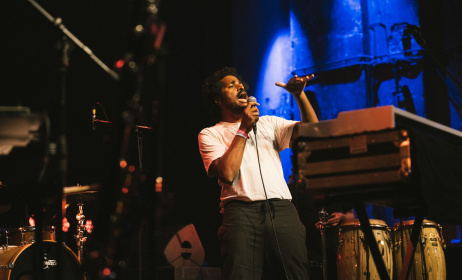Céline and Lionel give Lagos a night of fine jazz
If you happened to pass by Jazzhole sometime yesterday evening, you might have noticed some non-literary activity going on at the popular Ikoyi, Lagos bookstore.
 Lionel Loueke and Céline Rudolph have played the Lagos leg of their Obsession tour.
Lionel Loueke and Céline Rudolph have played the Lagos leg of their Obsession tour.
Jazz acts Lionel Loueke and Céline Rudolph were within and about to perform songs from their collaborative album Obsession. They were introduced by Friederike Möschel, director of the Goethe Institut Lagos, who, dressed elegantly and speaking excitedly, preached silence to the room.
“The music needs all of your attention,” she said.
Her plea seemed only right as the artists had travelled quite some distance for the performance, as not only was it the Nigerian leg of a tour that began in Dakar some ten days ago, it was also the current phase of a professional relationship that started five years ago when the artists met in Berlin, Germany. Not that both had never encountered Nigeria in some form before: While Loueke is of Beninese descent, Rudolph was born to a father who brought Fela albums home.
"Maybe the wind brought us here," said Rudolph as she began with 'Le Vent du Nord', a line she translated to mean “the wind that comes from the north”. The silence in the room could have been due to Möschel’s admonition—or from a sense of alienation from music so different from anything that might have been playing at that very moment at any of the clubs or restaurants just down the road from Jazzhole.
The night's first English song ‘New Day’ followed. A much friendlier tune to an ear accustomed to the strains of Nigerian music, it was more melodic and had Loueke, with some verbal clicks, threatening to make the music somewhat danceable to a listener with some imagination. Rudolph’s contribution, however, seemed to challenge that danceability.
The song ‘Here Comes the Rain’, a sober tune veering into ballad territory, had the artists play their guitars, each one’s gesture and sound complimenting the other. A spare lyrical composition, the song had words bound together by the repetition of the title, making a peculiar hypnosis of this stretch of their music. The hypnosis was broken by a problem with the sound, which Rudolph attempted to fix by speaking gently to the technical crew.
"The sound guy wouldn't know she's speaking to him," someone said. She speaks “like a song."
Around the bookstore, notable figures in the Nigerian culture community were present. The novelist Igoni Barrett looked on; musician Brymo watched, transfixed or merely inscrutable; and writer Teju Cole whispered along to a portion of a Caetano Veloso song played by the night’s performers.
Onstage the artists worked their instruments, Rudolph stationary, a monitor before her, Loueke, hunched over his guitar, and occasionally swaying on his stool. They played more songs— including 'Fábula' and 'Rêve Obsession'— the lyrics to one translated by Rudolph to mean "In the night I think of if you love me and most of all when?" Whether the “when” was the result of a gap in translation or about the physical consummation of love went unanswered. This elusiveness permeated the song’s guitar strains which seemed there not quite there to back Rudolph’s vocals.
The night ended with a love song in English and French titled 'C'est un Love Song ', and by the song’s own end, the audience had shaken off Möschel ’s early counsel as it sang along to a line repeated again and again at the finale.
Surely, the director wouldn’t have cared. The audience had paid attention but now wanted to pay vocal homage to the musical talents of Rudolph and Loueke, both of whom had demonstrated that what is alienating at first can become welcoming at last.
Buy Obsession by Céline Rudolph and Lionel Loueke here



























Commentaires
s'identifier or register to post comments